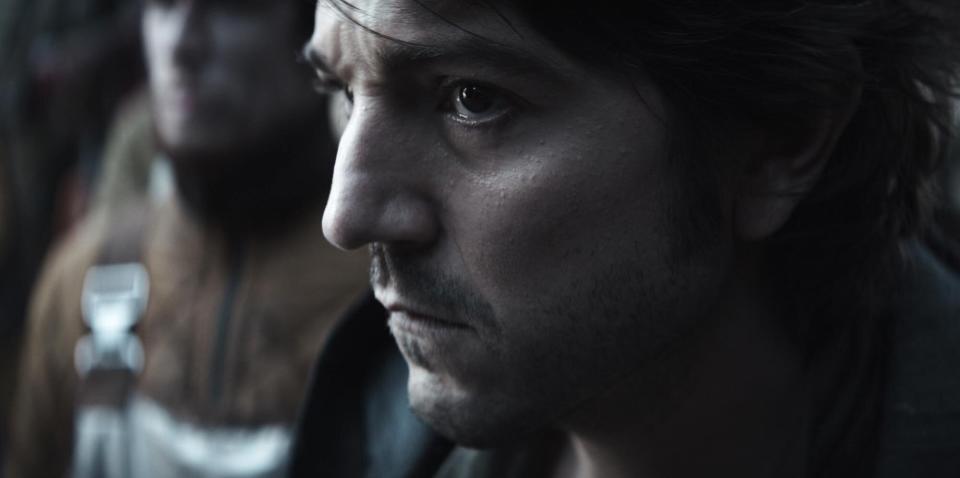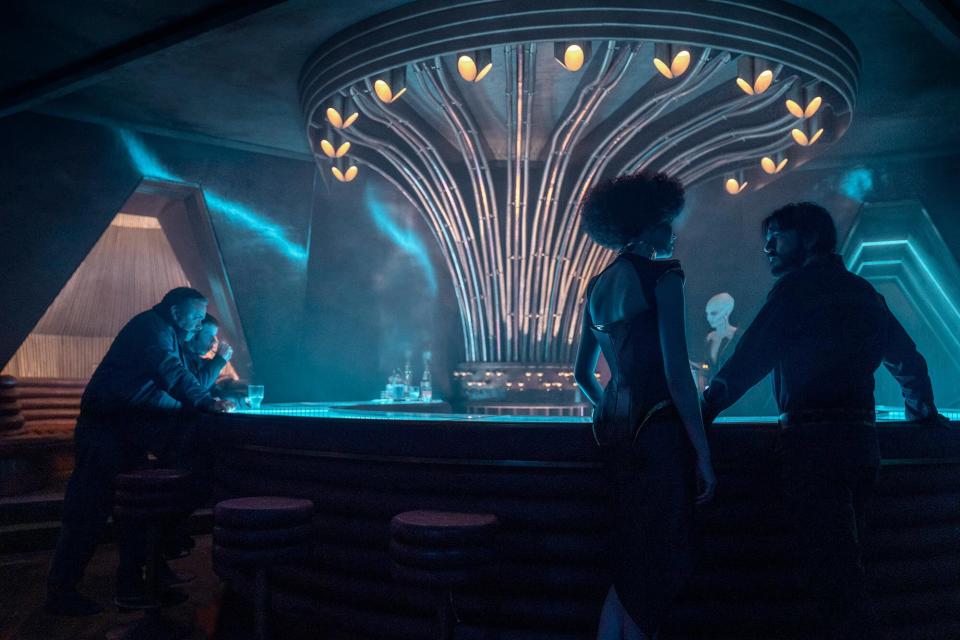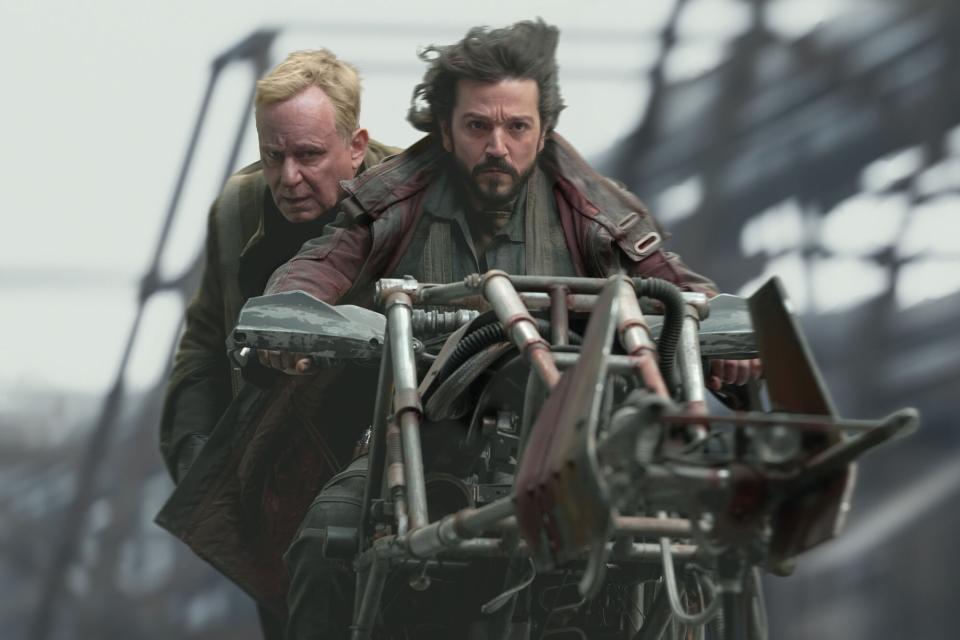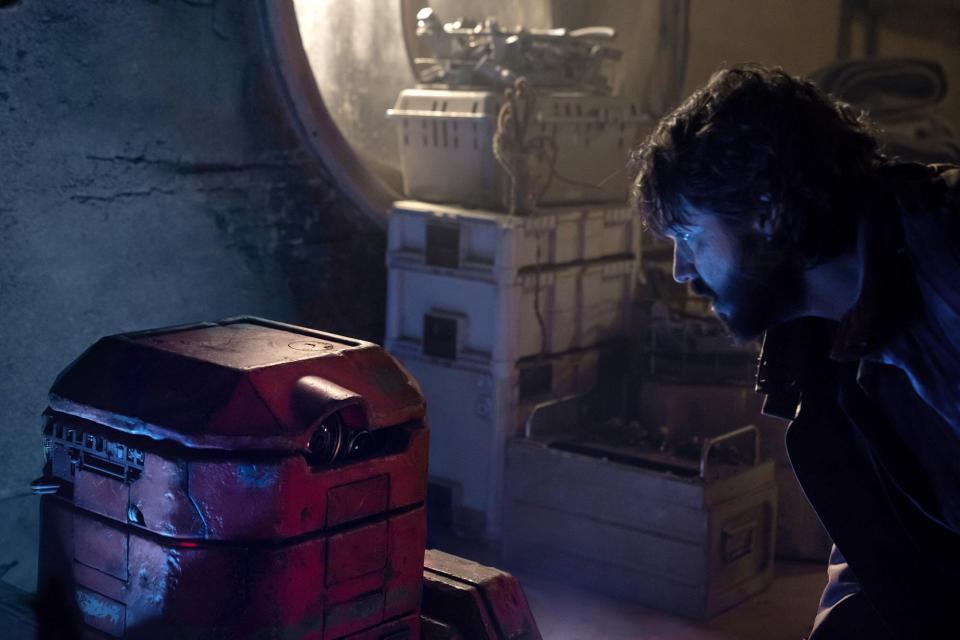Diego Luna weighs in on Cassian's murderous moment on Andor
- Oops!Something went wrong.Please try again later.
Warning: This article contains spoilers about the first three episodes of Andor.
Forget about Han and Greedo. Cassian Andor proved he was the character who truly shot first when he straight up murdered an informant who was causing too much of a commotion on the Ring of Kafrene in his introductory scene of Rogue One. The fact that one of the heroes of the film was doing this to an ally in his first scene showed he was a different type of character than we've met before in the Star Wars galaxy.
Now, courtesy of Andor, the prequel series to the prequel film is showing us Cassian's itchy trigger finger is still on display. The series began with our title character once again murdering a man, although these circumstances were quite different. The first three episodes of the show have now been released on Disney+, and begin with a bang — one that has big consequences and sets the series into motion.
Searching in a brothel for his long-lost sister in the corporate zone of Morlana One, Cassian encountered a pair of corporate security guards out looking for trouble. When the pair tried to shake Cassian down for cash later, Andor fought back, accidentally killing one of them. But it is what happened next that was so surprising, as Cassian looked into the other man's eyes and shot him right in the head.
What was behind Cassian's murderous moment? And why, when he later in episode 3 was told to kill Deputy Inspector Syril Karn (Kyle Soller), did he spare the enemy's life? We spoke to series star Diego Luna on EW's Star Wars podcast, Dagobah Dispatch, to get all the insight and intel into Cassian's two big decisions. Of course, we also asked what the real deal is with Cassian and Bix (Adria Arjona), and what to expect coming up next. Read on below, or to listen to the entire interview, check out the Dagobah Dispatch podcast.

Lucasfilm Ltd. Diego Luna on 'Andor'
ENTERTAINMENT WEEKLY: In the movie, Cassian says, "I've been in this fight since I was 6 years old." Yet when we first meet him here, he's not part of the Rebellion. He has no love for the Empire, but he's not actively fighting them. Why is he so hesitant to, as Luthen says, "fight these bastards for real"?
DIEGO LUNA: I think it's just another example of what oppression looks like — when you don't think there are options, when every chance of hope is taken away from you. And I think that's when we meet these characters and this community, in a moment where there's just the Empire. There are no two sides yet. I think the beauty of this show is that we are going to see what oppression looks like, feels like — what it is to be in a marginalized world where you can't articulate community and where all your freedom is taken away.
We'll see what he means with being part of the fight since he was six-years-old. And through the course of these 12 episodes, we'll understand what that background is. We'll understand why Cassian sounds different than anyone else in Rogue One. No one has that accent. No one seems to come from where he comes from. We'll get to understand that, and understand what that past really is. And what he means with the struggle, with the dark past, with being part of a fight since he was really young.
And I believe is a story of someone that has been forced to migrate and is a refugee. It's someone that clearly has gone in this life through the experience of the Empire taking away everything. But that's not just him, its so many people in this galaxy. And we have to go and witness how that feels in order to understand why a rebellion is needed.
One of the things I loved about Rogue One is that Cassian is a hero, and yet in the very first scene where we meet him in that film, we see him straight up murder a dude, and a dude who is actually helping him and the cause out as an informant. So let's spin that into what we see here at the start of the first episode of Andor, where Cassian accidentally kills one of these corporate security guys trying to shake him down, but then he very clearly intentionally kills the second one. What's behind that decision and what does that say about Cassian?
We find him in a very dark moment, and he understands, because of oppression, what killing that first corporal means. He is a survivor, no matter what it takes. And I think it tells you about what justice means in the galaxy then. There's no way you can expect justice to be fair. And he has to fix it himself, because there is nowhere to go, no one to convince, and no one to help him.
It's like the absence of state. It happens in the places where there's an absence of the institution that would provide justice. There's no sense of that in this world. There's no sense of that in this galaxy. Therefore, he understands that his only possibility of not being thrown in jail forever is basically finishing the life of this other corporal. And that triggers our story.

Des Willie/Lucasfilm Ltd. Lee Boardman, Stephen Wight, Margaret Clunie, Caroline Green, and Diego Luna on 'Andor'
But it's interesting, because he'll do what needs to be done, but then does have a code. Like in Rogue One, we see him kill that informant in the alley when we first meet him because he's going to draw all the attention, yet then when he has a chance to kill Galen Erso, he doesn't do it. And then we see here in episode 3, you've got a gun on Kyle Soller's character, Karn. Luthen says to kill him, but you just leave him tied up instead. So why spare him in that situation after killing the guy back in episode 1?
I think he learns from his mistakes. The problem of that second corporal is that they looked at each other in the eyes, therefore he's never going to forget that face. He's never going to forget. He will be hunted for the rest of his life. But he doesn't think of the scale of what he's doing, because we find him in a very selfish moment where he is not completely aware or interested in what's going on in the big picture.
He doesn't realize how much is he defining the rest of his life by that decision. He's not thinking about that. He's just thinking about saving the day, going back home, getting rid of all the possible trace that he can leave. And he really thinks he's going to be able to escape, to go hide for a few months, and then go back to be who he was.
Whoops!
And that for us was really important, to make sure we understand that we are seeing a childish version of the Cassian we met. Someone that is not completely aware of the big scale and of the repercussions of his acts. But after this event, he's transformed. He has a moment where he tells his mom, "I messed up." And. The next time he's in front of someone with a gun in the hand, he thinks twice.
And that's the beauty of this show there. There's always chance for redemption. Characters are not good and bad. They live in the gray areas. They're trying to be the best version of themselves, but they fail sometimes. And the beauty of these characters is that they give themselves another chance, which is something I believe important to say. We're not meant to be perfect. We're meant to understand and to grow with the mistakes we make. But mistakes are important in life, and the only certainty we have. If you're a real human being, the only certainty you have is that you mess up, many times. But what happens when you mess up is what makes you different.

Des Willie/Lucasfilm Ltd. Stellan Skarsgard and Diego Luna in 'Andor'
By the time Cassian leaves Ferrix with Luthen, is he all in or is he just trying to get away from trouble and is only kind of half-in at this point?
No, I don't think he's all in. There's still a long ride to go. And many things have to happen still to him, and many people has to cross paths with him. I think he's confused. Things have happened too fast and suddenly, by one decision of not playing the game of the corporals, and not paying and letting it happen, he reacts to abuse in a way that becomes quite destructive for him.
But one thing is clear, he can't stand abuse. He can't stand what happens with those corporals. He won't stand that anymore in his life. Which is a good sign, because that's where the seed is planted. You understand that this man just can't handle injustice, can't handle oppression, can't handle abuse.
What's Cassian's relationship with Bix? Are they just friends, or something more?
Oh man, we are going to have to wait. But what I can tell you, and it's obvious, I mean, it's a long relation. They know each other pretty well. They've been around for a long time. And the relation has transformed in many ways. I think you can tell in the way he talks to his mom about Bix, that she is special for him. She's something else.
Did you ever meet the kid playing young Cassian?
Of course! We saw each other when he flew to London to do his last session, just to make sure that he was the one. He's Mexican. For me, it was important that he was someone that would come from where I come from. To me, that's really important. It's very subtle, but you can tell that we share something. This role was important, that it would come from Mexico.
And this kid is magical. He's very special. And does a lot with his eyes, which is important for this role more than any other role. And he has that spark that is really cool, in his eyes. But yeah, I did spend time with him. We were shooting at the same time in London, so I was able to welcome him and make him feel part of the family and the team.

Des Willie/Lucasfilm Ltd. Diego Luna on 'Andor'
You've left Ferrix now. So what can you tell people to expect coming up?
Oh, man. I would say a lot of water and a lot of green. The beauty of this show is that every time you think you know what to expect, what's going to happen, what characters are around, what the tone is also, the series will transform, will evolve and go somewhere else. And it's this format that allows us to do that. You are about to meet a lot of new characters. You are about to explore a planet you didn't know existed.
And that's going to keep happening. That's going to keep happening, which is the beauty again, not just of this format, but of this project that took that risk of moving forward. The story of Cassian has to move forward. It's not stationary, it's about that journey, that transforming journey. So be open for new stuff to come.
For more on Andor, including exclusive interviews with stars like Diego Luna and Genevieve O'Reilly, listen to EW's Star Wars podcast, Dagobah Dispatch.
Want more TV news? Sign up for Entertainment Weekly's free newsletter to get the latest trailers, celebrity interviews, film reviews, and more.
Related content:

